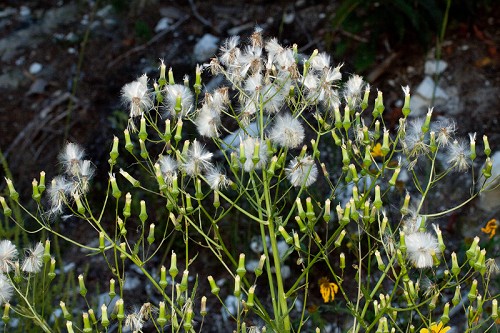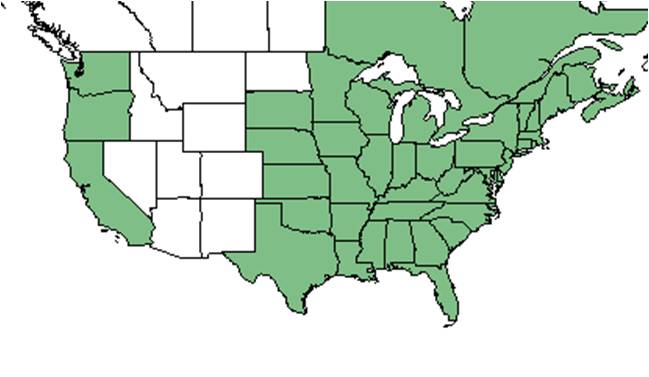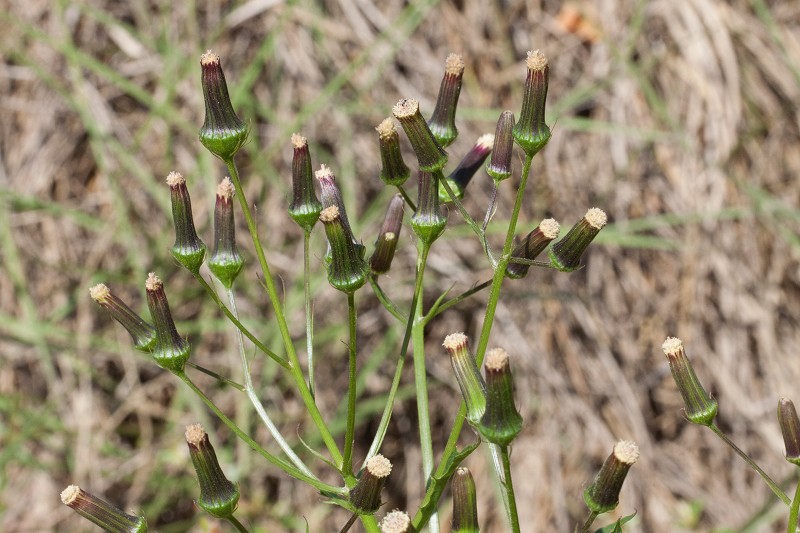Difference between revisions of "Erechtites hieracifolia"
| Line 18: | Line 18: | ||
}} | }} | ||
| − | Common name: American burnweed | + | Common name: American burnweed; fireweed |
==Taxonomic notes== | ==Taxonomic notes== | ||
| − | Synonym: ''Erechtites hieracifolia'' var. ''hieracifolia''[http://www.theplantlist.org/tpl1.1/record/gcc-13885 The Plant List.org]; ''E. hieracifolia'' var. ''intermedia'' Fernald; ''E. hieracifolia'' var. ''praealta'' (Rafinesque) Fernald; ''E. hieracifolia'' | + | Synonym: ''Erechtites hieracifolia'' var. ''hieracifolia''[http://www.theplantlist.org/tpl1.1/record/gcc-13885 The Plant List.org]; ''E. hieracifolia'' var. ''intermedia'' Fernald; ''E. hieracifolia'' var. ''praealta'' (Rafinesque) Fernald; ''E. hieracifolia''; ''Senecio hieraciifolius'' Linnaeus |
==Description== | ==Description== | ||
Revision as of 17:50, 8 May 2019
| Erechtites hieracifolia | |
|---|---|

| |
| Photo by John R. Gwaltney, Southeastern Flora.com | |
| Scientific classification | |
| Kingdom: | Plantae |
| Division: | Magnoliophyta - Flowering plants |
| Class: | Magnoliopsida - Dicotyledons |
| Order: | Asterales |
| Family: | Asteraceae ⁄ Compositae |
| Genus: | Erechtites |
| Species: | E. hieracifolia |
| Binomial name | |
| Erechtites hieracifolia (L.) Raf. ex DC. | |

| |
| Natural range of Erechtites hieracifolia from USDA NRCS Plants Database. | |
Common name: American burnweed; fireweed
Contents
Taxonomic notes
Synonym: Erechtites hieracifolia var. hieracifoliaThe Plant List.org; E. hieracifolia var. intermedia Fernald; E. hieracifolia var. praealta (Rafinesque) Fernald; E. hieracifolia; Senecio hieraciifolius Linnaeus
Description
"Robust annual with erect, glabrous or slightly pubescent, solid stems, 0.4-3 m or more tall. Leaves alternate, elliptic to lanceolate, 5-20 cm long, 0.5-6.5 cm wide, acute to acuminate, irregularly serrate to dentate, unlobed or lobed, base cuneate to attenuate or upper stem leaves auriculate. Heads in panicles. Involucres cylindric, 10-20 mm long, 4-8 mm broad; bracts in 1 series or with a few small bracts at base. Disc 3-10 mm broad. Flowers discoid, lobes cream to pinkish, erect, 0.3-0.5 mm long. Nutlets brown, tapered from base to apex, 1.9-2.7 mm long, 0.4-0.7 mm broad, 10-ribbed, pubescent; pappus white, capillary, 10-14 mm long." [1]
Distribution
Ecology
Phenology
E. hieracifolia has been obseved flowering in March, June, July, and November.[2]
Seed dispersal
This species is thought to be dispersed by wind. [3]
Seed bank and germination
E. hieracifolia was found in the seed banks of bays dominated by herbaceous and shrub plants in western South Carolina. [4]
Pollination
The following Hymenoptera families and species were observed visiting flowers of Erechtites hieracifolia at Archbold Biological Station. [5]
Halictidae: Halictus poeyi
Leucospididae: Leucospis affinis
Megachilidae: Dianthidium floridiense
Vespidae: Leptochilus republicanus, Parancistrocerus bicornis, P. salcularis rufulus, Polistes dorsalis hunteri
Conservation and management
Cultivation and restoration
Photo Gallery
Erechtites hieracifolia Photo by John R. Gwaltney, Southeastern Flora.com
Erechtites hieracifolia Photo by John R. Gwaltney, Southeastern Flora.com
References and notes
- ↑ Radford, Albert E., Harry E. Ahles, and C. Ritchie Bell. Manual of the Vascular Flora of the Carolinas. 1964, 1968. The University of North Carolina Press. 1037. Print.
- ↑ Nelson, G. PanFlora: Plant data for the eastern United States with emphasis on the Southeastern Coastal Plains, Florida, and the Florida Panhandle. www.gilnelson.com/PanFlora/ Accessed: 8 DEC 2016
- ↑ Kirkman, L. Katherine. Unpublished database of seed dispersal mode of plants found in Coastal Plain longleaf pine-grasslands of the Jones Ecological Research Center, Georgia.
- ↑ Navarra, J. J. and P. F. Quintana-Ascencio 2012. Spatial pattern and composition of the Florida scrub seed bank and vegetation along an anthropegenic disturbance gradient. Applied Vegetation Science 15:349-358.
- ↑ Deyrup, M.A. and N.D. 2015. Database of observations of Hymenoptera visitations to flowers of plants on Archbold Biological Station, Florida, USA.

